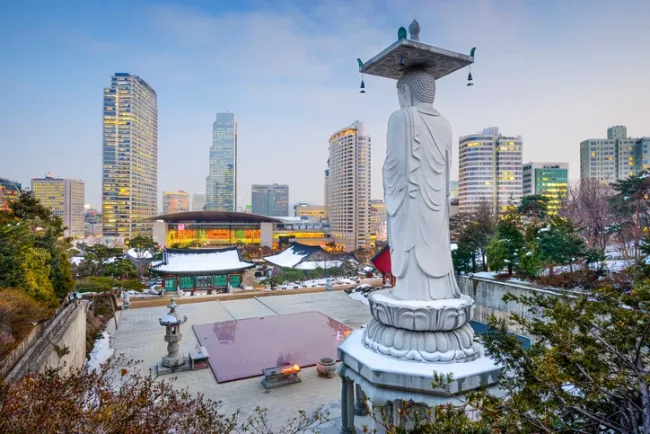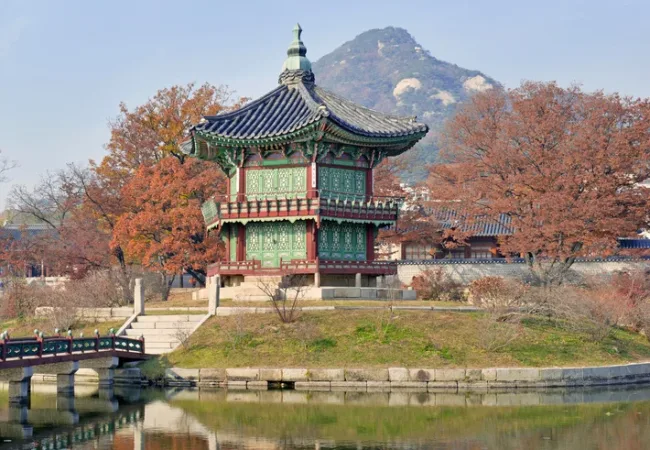
South Korea
Welcome to South Korea
Wondering if you need a visa for your trip to South Korea? We're here to help. This guide will clarify if you need a visa, identify the appropriate visa type based on your travel plans, and guide you through the application process.

What’s a South Korea ETA (K-ETA) and who’s it for?
Who’s the South Korea ETA for?
This is a digital pre-authorization required for foreign visitors who do not need a visa to enter South Korea. It applies to countries that have either a visa waiver agreement or are designated visa-free by the Republic of Korea.
More than 100 nationalities are eligible for the South Korea ETA, including Australia, Brazil, China, South Africa, Estonia, the United Arab Emirates, and more.
Do you qualify for the K-ETA? Use this [iVisa Checker Tool] (/) to find out.
Who’s not eligible for a South Korea ETA?
-
Individuals holding a valid South Korean visa.
-
Citizens of specific countries that are temporarily exempt from requiring a K-ETA, including the US, Canada, and member states of the EU.
-
Diplomatic or official passport holders, UN passport holders, ABTC holders, USFK service members, aircraft and ship crew members.
-
Travelers who are either 17 years old and under, or 65 years old and above.
What’s the purpose of the South Korea ETA?
The K-ETA is intended for short-term stays, including tourism, visiting family members, participating in events or meetings, or commercial business activities that do not involve profit-making.
How long can you stay with a South Korea ETA?
The K-ETA allows stays generally up to 90 days, but the permitted duration may vary by nationality, with a minimum of 30 days and a maximum of 6 months. The K-ETA remains valid for three years from the date of authorization, and multiple entries are typically allowed during its validity period.
What’s a South Korea Tourist Visa and who’s it for?
Who’s the South Korea Tourist Visa for?
Categorized as a C-3 visa, this visa is intended for nationals from countries that do not have a visa exemption or visa waiver agreement with South Korea.
Who’s not eligible for a South Korea Tourist Visa?
*Individuals who are citizens of countries that have a visa exemption or waiver agreement with South Korea.
-
Diplomatic or official passport holders.
-
Those who are visiting South Korea for reasons other than those outlined below.
What’s the purpose of the South Korea Tourist Visa?
For tourism, sightseeing, visiting friends or family, or experiencing the country's diverse culture.
How long can you stay with a South Korea Tourist Visa?
The visa typically allows for a stay of up to 90 days. The validity of the visa depends on various factors, including your nationality and the discretion of the consulate or embassy issuing the visa. South Korea Tourist Visas can be issued as single-entry or multiple-entry visas.
What’s a South Korea Business Visa and who’s it for?
Who’s the South Korea Business Visa for?
Also known as the C-2 Short-Term Business Visa, this visa is tailored for individuals planning to engage in short-term business activities in South Korea.
Who’s not eligible for a South Korea Business Visa?
Nationals of countries eligible for the K-ETA may opt for the K-ETA instead of a traditional business visa.
What’s the purpose of the South Korea Business Visa?
This visa is specifically for business-related travel and is not meant for employment or long-term stay in South Korea. Its primary purpose is to facilitate short-term business visits.
How long can you stay with a South Korea Business Visa?
The validity of the South Korea Business Visa can range from 90 days for single and double entries to 1-5 years for a multiple-entry visa. The exact duration of your stay will depend on the type of visa issued and is typically determined based on your specific business needs and itinerary.
What’s a South Korea Student Visa and who’s it for?
Who’s the South Korea Student Visa for?
Also known as the D-2 visa, this is primarily for international students who wish to pursue undergraduate or postgraduate studies in South Korea.
Who’s not eligible for a South Korea Student Visa?
Individuals who are not enrolled in a degree program at a South Korean educational institution or those who plan to engage in activities other than academic studies, such as employment.
What’s the purpose of the South Korea Student Visa?
The D-2 visa is designed for academic purposes. It allows international students to reside in South Korea for the duration of their academic program, which could include undergraduate, master's, or postgraduate studies.
How long can you stay with a South Korea Student Visa?
The typical validity of a D-2 visa is two years, regardless of the study level. However, if the duration of the study program exceeds the initial visa period, students can apply for a visa extension.
What’s a South Korea Work Visa and who’s it for?
Who’s the South Korea Work Visa for?
South Korea offers various types of work visas for professionals with specific skills and qualifications that align with South Korea's employment needs. Key categories include:
-
E-1 to E-7 Visas: Covering a range of professionals like professors, researchers, technical experts, and those in special occupations like fashion, advertising, trade, and sports.
-
D-7 Visa: For individuals dispatched to Korea as part of agreements with overseas companies.
-
D-8 Corporate Investment Visa: Ideal for foreigners planning to start businesses in Korea.
Who’s not eligible for a South Korea Work Visa?
-
Visitors from certain countries that can enter Korea without a visa but are not allowed to work without obtaining the necessary work permit.
-
Foreigners who do not meet the specific criteria set for each visa category, such as academic qualifications, professional experience, or investment capacity.
What’s the purpose of the South Korea Work Visa?
The purpose varies based on the visa type but generally includes:
-
Professional employment in various sectors.
-
Teaching, research, and technical guidance roles.
-
Investment and business establishment.
How long can you stay with a South Korea Work Visa?
The duration varies by visa type. Work visas like the E-series and D-series typically allow a stay of one to two years, with the possibility of extensions. Recent updates suggest that the D-10 visa, for job seekers, allows foreigners to stay in Korea for up to three years.
What’s a South Korea Transit Visa and who’s it for?
Who’s the South Korea Transit Visa for?
Travelers who choose South Korea as a stopover en route to other destinations. This visa is mandatory for citizens of a few specific countries, such as Egypt, Mongolia, Sudan, Syria, and Yemen, even if they do not leave the airport during their transit.
Who’s not eligible for a South Korea Transit Visa?
Most travelers who remain within the airport's international transit area and do not pass through South Korean immigration. This includes those transiting for less than 24 hours (at Incheon Airport) or departing on the same calendar day (at other airports) as long as they stay within the transit area.
What’s the purpose of the South Korea Transit Visa?
To facilitate short-term entry into South Korea for travelers passing through the country en route to another destination. It's designed to allow for a smooth and legal transition through South Korean airports during a layover or a short stopover.
How long can you stay with a South Korea Transit Visa?
The transit visa generally allows for a short stay, typically less than 24 hours, for those transiting through Incheon Airport, or until the end of the same calendar day for other airports. Transit visas are non-extendable, and travelers must adhere to the duration specified in the visa to avoid penalties or issues with immigration authorities.
What are the South Korean long-term visa options and who are they for?

South Korea offers a range of long-term visa options catering to various needs, including professional work, family reunification, investment, and education. The common ones include
-
D Series (For Professionals): Includes visas for artists, students, industrial trainees, journalists, religious workers, corporate investors, international trade participants, and job seekers.
-
E Series (Employment-Based Visas):Long-term visas for various professionals, such as professors, foreign language instructors, researchers, and those in special professions like architecture or engineering.
-
F Series (Family Visa): These visas are for family members (spouses and minor children) of long-term visa holders. The F-3 visa allows them to legally stay in South Korea.
-
F-2-7 Points System Visa: This visa is based on a points system, considering factors like educational background, income, and other ties to Korea. It's a pathway to obtaining long-term residence and potential citizenship.
-
F-5 Permanent Resident Visa: After residing in South Korea for several years on a long-term visa, eligible applicants can switch to this visa. It allows indefinite living and working in South Korea without the need for annual visa renewals.
-
South Korea Digital Nomad Visa: This visa, also known as the workation visa, is designed for remote workers who want to live and work in South Korea while being employed by a company abroad.
It's important to note that we do not handle tourist, business, student, work, and transit visas or long-term visa applications. For details on how to apply for them, you should visit the Republic of Korea’s Ministry of Foreign Affairs website.
Staying healthy in South Korea: Here’s what you need to know
South Korea offers good quality and well-organized healthcare facilities. When planning your trip, it’s crucial to be aware of health considerations and prepare accordingly.
Make sure to stay updated on routine vaccines
-
Consider getting the Japanese Encephalitis vaccine if you're going to spend time in rural areas or engaging in outdoor activities, especially between April and November. Rabies is a concern if you’ll be working directly with wildlife. South Korea is free of dog rabies, but rabies may still be present in wildlife, particularly bats.
-
If visiting certain areas, you might need malaria prevention medicine. Discuss this with your doctor before traveling. Tick-borne Encephalitis (TBE) and H5N1 Avian Influenza have also been reported in South Korea. Take preventive measures and stay informed about these diseases.
-
Keep updated with South Korea’s COVID-19 requirements, such as quarantine, testing, or vaccine certificates, through your airline or the Korea Disease Control and Prevention Agency website.
Medical facilities
-
South Korea boasts an impressive healthcare system, especially in urban centers like Seoul. However, be aware that medical facilities in rural or isolated areas may not be as well-equipped.
-
Pharmacies are readily available, offering a range of over-the-counter drugs and helpful advice.
Health insurance
It's highly recommended to have health insurance for your trip.
Medical treatments, particularly in private clinics, can be costly. It's crucial that your insurance covers significant health-related costs, including the possibility of medical evacuation.
Before departing, check with your insurance company to ensure your policy provides comprehensive coverage. Key aspects to look for in your coverage include:
-
Reimbursement for any travel cancellations, delays, or disruptions.
-
Coverage of medical expenses and the costs associated with medical evacuation.
-
Protection against loss of luggage.
Things to be aware of when visiting South Korea

Keep an extra eye on the following to keep healthy and safe during your trip to South Korea:
-
Weather: South Korea has a monsoon season, usually from June to July, which can bring heavy rainfall and occasional flooding. Keep an eye on weather alerts and consider adjusting your travel plans if necessary.
-
Air quality: South Korea can experience periods of poor air quality, especially in urban areas. Check the air quality index, and if air pollution is high, consider wearing a mask to protect yourself.
-
Outdoor safety: If hiking or exploring South Korea’s mountains, follow safety guidelines and be well-prepared.
Medication for personal use
When entering South Korea with medication, consider the following essential guidelines:
-
Declare all medications: You must declare any prescription drugs or controlled substances upon your arrival.
-
Keep original packaging: Always carry medicines in their original containers, with clear labels indicating the prescription.
-
Carry a prescription or doctor's note: Have a valid prescription or a doctor’s note that clarifies the necessity of each medication.
-
Check for restrictions: Ensure your medicines are allowed in South Korea. Some drugs are subject to restrictions or bans. The Korea Institute of Drug Safety and Risk Management offers comprehensive details on medication rules, including a list of controlled substances.
-
Limit quantity: Bring only the quantity of medication required for the duration of your stay to prevent any complications.

 Australia ETA Online
Australia ETA Online
 United Kingdom ETA
United Kingdom ETA
 India Tourist eVisa
India Tourist eVisa
 Canada ETA Visa
Canada ETA Visa
 Turkey eVisa
Turkey eVisa
 Egypt eVisa
Egypt eVisa
 Singapore SG Arrival Card
Singapore SG Arrival Card
 Indonesia eVoa Visa
Indonesia eVoa Visa
 Aruba ED Card
Aruba ED Card


